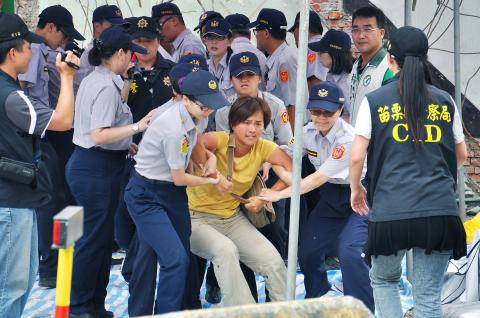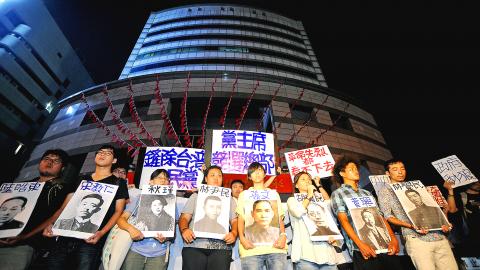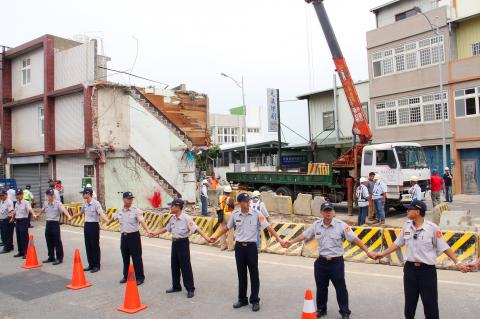Following the forced demolition of four houses in Miaoli County’s Dapu Borough (大埔) on Thursday, protesters have staged several flash-mob protests in Miaoli and Taipei.
Around a dozen protesters turned up in front of President Ma Ying-jeou’s (馬英九) Chinese Nationalist Party (KMT) chairmanship election campaign headquarters in Taipei a little before 8pm last night, and began throwing eggs at the building while chanting, “You tear down the Dapu houses today, we will tear down the government tomorrow!”
By the time police arrived on the scene the egg-throwing had ended. Nevertheless, two protesters, Wang Chung-ming (王鐘銘) and Wu Hsueh-chan (吳學展), were detained and charged with violation of the Social Order Maintenance Act (社會秩序維護法).

Photo: Peng Chien-li, Taipei Times
The police declined to say whether they had evidence proving the two’s involvement in the egg-throwing protest.
The pair were still at the police station as of press time.
About half an hour before the protest, a larger crowd demonstrated outside the KMT headquarters in Taipei and clashed with police as they threw eggs at the building.

Photo: Liu Hsin-de, Taipei Times
Meanwhile, in Miaoli, four protesters staged a surprise protest outside Miaoli County Commissioner Liu Cheng-hung’s (劉政鴻) residence in Houlong Township (後龍) early yesterday morning.
“Rise up against the tyranny of Liu Cheng-hung that tore down the Dapu houses, Taiwanese!” The four shouted as they carried five large cans of yellow and white paint while running toward Liu’s house after arriving on scooters at around 6:20am.
Security guards outside the house scuffled with the four in a bid to try to stop them, and paint was splashed on the ground.

Photo: Peng Chien-li, Taipei Times
Hearing the commotion, Liu looked down from a second-floor balcony, and called the protesters “shameless.”
The quartet were arrested and charged with damaging property.
Chen Wei-ting (陳為廷), a native of Miaoli and a National Tsing Hua University student who was one the protesters, said they wanted Liu to know what it was like to have his house threatened.
The other three protesters were National Taiwan University students.
On Thursday, after the forced demolition in the morning, farming activist Yang Ru-men (楊儒門) and long-time social activist Lee Chien-cheng (李建誠) were arrested at around 6:30pm for trying to throw paint at the Presidential Office in protest at the forced demolition.
Earlier yesterday, Vice President Wu Den-yih (吳敦義) was confronted by a group of students shouting, “You will be punished for breaking promises!” as he attended an award ceremony in Taipei.
Later, in response to media inquiries, Wu he said he was “surprised” by Thursday’s demolition, but insisted it was within the county government’s authority to handle the case.
“I was quite surprised by the county government’s move. However, the county government handled the incident in accordance with the law. How can we overstep our authority and interfere with local affairs?” he said.
Additional reporting by Mo Yan-chih

US President Donald Trump yesterday announced sweeping "reciprocal tariffs" on US trading partners, including a 32 percent tax on goods from Taiwan that is set to take effect on Wednesday. At a Rose Garden event, Trump declared a 10 percent baseline tax on imports from all countries, with the White House saying it would take effect on Saturday. Countries with larger trade surpluses with the US would face higher duties beginning on Wednesday, including Taiwan (32 percent), China (34 percent), Japan (24 percent), South Korea (25 percent), Vietnam (46 percent) and Thailand (36 percent). Canada and Mexico, the two largest US trading

ACTION PLAN: Taiwan would expand procurement from the US and encourage more companies to invest in the US to deepen bilateral cooperation, Lai said The government would not impose reciprocal tariffs in retaliation against US levies, President William Lai (賴清德) said yesterday, as he announced five strategies to address the issue, including pledging to increase Taiwanese companies’ investments in the US. Lai has in the past few days met with administrative and national security officials, as well as representatives from various industries, to explore countermeasures after US President Donald Trump on Wednesday last week announced a 32 percent duty on Taiwanese imports. In a video released yesterday evening, Lai said that Taiwan would not retaliate against the US with higher tariffs and Taiwanese companies’ commitments to

‘SPECIAL CHANNEL’: Taipei’s most important tasks are to stabilize industries affected by Trump’s trade tariffs and keep negotiations with Washington open, a source said National Security Council Secretary-General Joseph Wu (吳釗燮) arrived in the US for talks with US President Donald Trump’s administration, a source familiar with the matter said on Friday. Wu was leading a delegation for a meeting known as the “special channel,” the Financial Times reported earlier. It marked Trump’s first use of the channel since returning to the White House on Jan. 20. Citing a source familiar with the matter, the Financial Times reported that Minister of Foreign Affairs Lin Chia-lung (林佳龍) was also a part of the delegation. The visit came days after China concluded war games around Taiwan and amid Trump’s

CHIP EXCEPTION: An official said that an exception for Taiwanese semiconductors would have a limited effect, as most are packaged in third nations before being sold The Executive Yuan yesterday decried US President Donald Trump’s 32 percent tariff on Taiwanese goods announced hours earlier as “unfair,” saying it would lodge a representation with Washington. The Cabinet in a statement described the pledged US tariffs, expected to take effect on Wednesday next week, as “deeply unreasonable” and “highly regrettable.” Cabinet spokeswoman Michelle Lee (李慧芝) said that the government would “lodge a solemn representation” with the US Trade Representative and continue negotiating with Washington to “ensure the interests of our nation and industries.” Trump at a news conference in Washington on Wednesday announced a 10 percent baseline tariff on most goods